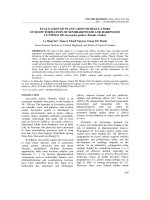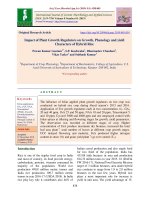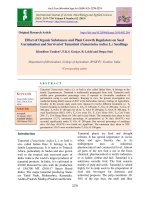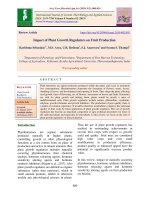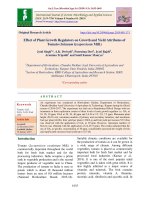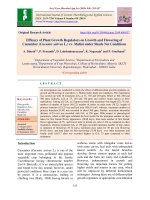Effect of different plant growth regulators on shooting of stem cuttings in dragon fruit [Hylocereus undatus (Haworth) Britton & Rose]
Bạn đang xem bản rút gọn của tài liệu. Xem và tải ngay bản đầy đủ của tài liệu tại đây (266.98 KB, 7 trang )
Int.J.Curr.Microbiol.App.Sci (2019) 8(5): 1621-1627
International Journal of Current Microbiology and Applied Sciences
ISSN: 2319-7706 Volume 8 Number 05 (2019)
Journal homepage:
Original Research Article
/>
Effect of Different Plant Growth Regulators on Shooting of Stem Cuttings
in Dragon Fruit [Hylocereus undatus (Haworth) Britton & Rose]
Ayesha Siddiqua1*, D. Thippesha2, M. Venugopala Reddy3 and N. Deeksha Raj4
1
2
Department of Fruit science, College of Horticulture, Mudigere-577132
Department of Horticulture, College of Agriculture, UAHS, Shivamogga-577225
3
Department of Horticulture, College of Agriculture, UAS, Raichur-584104
4
Department of Horticulture, College of Agriculture, UAS, Bengaluru-560 065
*Corresponding author
ABSTRACT
Keywords
Dragon fruit, IBA,
Stem cuttings, Plant
growth regulators,
DAP (Days after
planting)
Article Info
Accepted:
15 April 2019
Available Online:
10 May 2019
An investigation was done to study the effect of different plant growth regulators on
shooting of stem cuttings in Dragon fruit (Hylocereus undatus (Haworth) Britton & Rose)
at the Department of Horticulture, College of Agriculture, UAHS Shivamogga, during the
year 2017-18. The experiment was laid out by following Complete Randomized Block
Design with twelve treatments and three replications. The stem cuttings of Dragon fruit
treated with different plant growth regulators result reveals that, least number of days
taken for sprout initiation (7.34), maximum percentage of sprouting at 30 and 60 DAP
(40.24 and 58.67 %), number of sprouts per cutting at 30,60 and 90 DAP (0.96, 1.77 and
2.43), length of the sprout and shoot (2.63, 8.35 and 17.45 cm), shoot diameter (2.92, 3.08
and 3.53 cm), fresh weight of the shoot (15.49, 25.66 and 56.66 g) dry weight of shoot
(5.19, 7.81 and 11.12 g), root to shoot ratio (0.22, 0.57 and 0.67) respectively was recorded
in cuttings treated with IBA 7000 ppm. Among the different growth regulators application
of IBA 7000 ppm was found to improve shooting of stem cuttings in Dragon fruit under
low cost poly house condition.
Introduction
Dragon fruit (Hylocereus undatus (Haworth)
Britton & Rose) is popular in South East Asia.
It is an edible vine cactus species belonging to
the family Cactaceae which has received
worldwide recognition first as an ornamental
plant and then as a fruit crop. It is commonly
called as Pitaya. It is one of the newly
introduced exotic fruit crop in India. It is well
known for its rich nutrient contents specially
vitamin C, phosphorus, calcium as well as its
antioxidant characteristics (Morton, 1987). It
has wide range of medicinal properties like
anti cancerous, prevents asthma, reduces
arthritis pain, good for bone health, improves
heart related problems. The common method
adopted for propagation of dragon fruit is by
seeds and stem cuttings. Besides, stem
cuttings is the most convenient, rapid and
1621
Int.J.Curr.Microbiol.App.Sci (2019) 8(5): 1621-1627
simple method of plant propagation as it
carries all the desirable characters of a mother
plant. The information on use of growth
regulators on shooting of stem cuttings in
Dragon fruit is meager. Hence, the
experiment is conducted to know the effect of
growth regulators and their combinations on
shooting of stem cuttings.
Materials and Methods
An experiment was done on the “Effect of
different plant growth regulators on shooting
of stem cuttings in dragon fruit [Hylocereus
undatus (Haworth) Britton & Rose]” was
conducted in low cost poly house of the
Department of Horticulture, College of
Agriculture, UAHS Shivamogga, during the
year 2017-18. The experiment was laid out in
Completely Randomized Block Design with
twelve treatments and three replications viz.,
T1-IBA (5000ppm), T2-IBA (6000ppm), T3IBA (7000ppm), T4-NAA (100ppm), T5-NAA
(200ppm), T6-IBA (5000ppm) + NAA
(100ppm), T7-IBA (5000ppm) + NAA
(200ppm), T8- IBA (6000ppm) + NAA
(100ppm), T9- IBA (6000ppm) + NAA
(200ppm), T10- IBA (7000ppm) + NAA
(100ppm), T11- IBA (7000ppm) + NAA
(200ppm), T12- control (dipped in normal
water). The cuttings were treated with varied
levels of growth regulators as per the
treatment and planted in the poly bags filled
with Soil, Sand and FYM in 2:1:1 proportion
for easy rooting one basal node was buried in
the medium. The planted poly bags were kept
inside low cost poly house for rooting.
Results and Discussion
Number of days taken for sprout initiation
concentrations for days taken to first sprout.
The data obtained is presented in Figure 1.
Among the different concentrations, the
cuttings treated with (T3) IBA7000ppm (7.34)
took less number of days for the sprout
initiation which was on par with (T2) IBA
6000 ppm (7.65) and (T1) IBA 5000 ppm
(8.39). Significantly maximum number of
days required for first sprouting (16.33) was
in untreated cuttings (T12). It could be
attributed to the better utilization of reserve
carbohydrates, nitrogen and other nutrients
stored in stem cuttings by activation of
hydrolytic enzymes (Chandramouli, 2001).
Similar findings were reported by Shirol and
Patil (1992) in Ixora.
Percent sprouting
The data pertaining to sprouting percentage as
influenced by different concentration of
growth regulators with different combination
at the different stages of growth are presented
in Figure 2.
The maximum percentage of sprouting at 30
and 60 DAP was recorded in cuttings treated
with (T3) IBA 7000 ppm (40.24 and 58.67%).
While, the control (T12) recorded the
minimum percentage of sprouting (9.12 and
18.25 %). This might be due to the fact that
auxins are known to induce stimulus for
regeneration of roots by promotion of
hydrolysis, mobilization and utilization of
nutritional reserves in the region of root and
shoot formation (Nanda, 1975). Similar
results are reported by Swetha (2005) in
Lavender.
Number of sprouts per cutting
In the present investigation, influence of
different plant growth regulators and their
combinations have greatly influenced the days
taken for sprout initiation. Significant
differences were seen between auxin
The data pertaining to number of sprouts per
cutting as influenced by growth regulators
with different combination at the different
stages of growth are presented in Figure 3.
1622
Int.J.Curr.Microbiol.App.Sci (2019) 8(5): 1621-1627
The maximum number of sprouts per cutting
at 30, 60 and 90 DAP (0.96, 1.77 and 2.43)
was recorded in the cuttings treated with (T3)
IBA 7000 ppm. While minimum numbers of
sprouts (0.31, 1.09 and 1.41) were recorded in
control (T12). It could be perhaps due to
enhancement of physiological functions in the
cuttings favourably at this concentration.
Earliness in sprouting, increase in number of
sprouts might be due to better utilization of
stored carbohydrates, nitrogen and other
factors with the aid of growth regulators
(Chandramouli, 2001). These results are in
harmony with the outcome of Pervaiz et al.,
(2007) in Barbados cherry.
Shoot length (cm)
The data pertaining to length of sprout and
shoot per cutting as influenced by growth
regulators with different combination at the
different stages of growth are presented in
Figure 4. The highest shoot length at 30, 60
and 90 DAP was recorded in cuttings treated
with (T3) IBA 7000 ppm (2.63, 8.35 and
17.45 cm). While minimum length of shoots
(0.99, 1.24 and 2.93 cm) was recorded in
control (T12). It might be ascribed to better
root growth which augmented absorption and
translocation of nutrients from nursery soil
which take active part in various plant
metabolic processes (Singh 2001). Siddiqui
and Hussain (2007) reported maximum shoot
length and shoot diameter with IBA 4000
ppm in Ficus hawaii.
Diameter of shoot per cuttings (mm)
The data pertaining to the diameter of shoot
per cuttings as influenced by growth
regulators with different combination at the
different stages of growth are presented in
Figure 5. The maximum diameter of shoot at
30, 60 and 90 DAP (2.92, 3.08 and 3.53 cm)
was recorded in (T3) IBA 7000 ppm. While
minimum diameter of shoot (1.04, 1.41 and
1.45 cm) was recorded in control (T12). It
might be due to more number of leaves and
vigorous root system as a consequence of
better
carbohydrates
production
and
assimilation. The results are in conformity
with Upadhyay and Badyal (2007) in
Pomegranate.
Shoot fresh weight (g)
The data on the shoot fresh weight of Dragon
fruit cuttings as influenced by different
concentration of growth regulators with
different combination are furnished in Figure
6. The treatments differed significantly at 30,
60 and 90 days after planting. The highest
shoot fresh weight was seen in Dragon fruit
cuttings treated with (T3) IBA 7000 ppm
(15.49, 25.66 and 56.66 g). Lowest fresh
weight was seen in (T12) control (9.66, 19.63
and 25.52 g). This could be due to IBA,
which results in early sprouting, increase in
number of leaves and leaf area and well
developed shoot system. The results are in
accordance with the findings of Stancato et
al., (2003) in Rhipsalis.
Shoot dry weight (g)
The data on the shoot dry weight of Dragon
fruit cuttings as influenced by different
concentration of growth regulators with
different combination are furnished in Figure
7. The treatments differed significantly at 30,
60 and 90 days after planting.
Among the treatments highest shoot dry
weight was seen in Dragon fruit cuttings
treated with (T3) IBA 7000 ppm (5.19, 7.81
and 11.12 g). The least shoot dry weight of
Dragon fruit cuttings was found in (T12)
control (1.92, 3.71 and 6.85 g). This could be
due to earliness in sprouting, increase in
number of leaves and leaf area and higher
shoot fresh weight. Similar results are in
conformity with Shukla and Bist (1994) in
Pear, Shirol and Patil (1992) in Ixora.
1623
Int.J.Curr.Microbiol.App.Sci (2019) 8(5): 1621-1627
Fig.1 Number of days taken for sprout initiation
Fig.2 Percentage of cuttings sprouted at 30 and 60 DAP
Fig.3 Number of sprouts at 30, 60 and 90 DAP
1624
Int.J.Curr.Microbiol.App.Sci (2019) 8(5): 1621-1627
Fig.4 Length of the shoot at 30, 60 and 90 DAP
Fig.5 Shoot diameter at 30, 60 and 90 DAP
Fig.6 Shoot fresh weight at 30, 60 and 90 DAP
1625
Int.J.Curr.Microbiol.App.Sci (2019) 8(5): 1621-1627
Fig.7 Shoot dry weight at 30, 60 and 90 DAP
Fig.8 Root to shoot ratio at 30, 60 and 90 DAP
Root to shoot ratio
The data on the root to shoot ratio of Dragon
fruit cuttings as influenced by different
concentration of growth regulators with
different combination are furnished in Figure
8. The treatments differed significantly at 30,
60 and 90 days after planting.
The highest root to shoot ratio was seen in
Dragon fruit cuttings treated with (T3) IBA
7000 ppm (0.22, 0.57 and 0.67). Lowest root
to shoot ratio was seen in control (0.02, 0.11
and 0.20). The explanation for these
differences probably resides in crop type,
resource supply and other experimental
factors. The results are in accordance with the
findings of Seran and Thiresh (2015) and
Rahad et al., (2016) in Dragon fruit.
In conclusion, the study revealed that
application of different pant growth regulators
has great potential to induce shooting in stem
cuttings of dragon fruit. Among all the
treatments, IBA (7000 ppm) gave best results
with respect to shoot parameter followed by
IBA (6000 ppm). Based on the findings of
current investigation it is recommended that
1626
Int.J.Curr.Microbiol.App.Sci (2019) 8(5): 1621-1627
vegetative method of propagation through
stem cuttings in dragon fruit is reliable for
nursery plant production as it is quick and
easy method of vegetative propagation.
References
Chandramouli, H., 2001. Influence of growth
regulators on the rooting of different
types of cuttings in Bursera penicilliatai
(DC) Engl. M.Sc. Thesis, Univ. Agric.
Sci., Bangalore, Karnataka (India).
Morton, J. F., 1987. Fruits of warm climates.
Strawberry Pear. Florida Flair Books,
Miami. pp. 347-348.
Nanda, K. K., 1975. Physiology of
adventitious root formation. Indian J.
Pl. physiol., 18: 80-89.
Pervaiz, S., Beigh, M. A., Lone, R. A. and
Nanda, A. B., 2007. Effect of plant
growth regulators on rooting of
Barbados cherry. The Asian J. Hort.,
2(1): 152-154.
Rahad, M.K., Islam, M.A., Rahim, M.A. and
Monira, S., 2016. Effects of rooting
media and varieties on rooting
performance of dragon fruit cuttings
(Hylocereus undatus Haw.). Res. Agric.
Livest. Fish. An open Access Peer
Reviewed J., 3(1):67-77.
Seran, T.H. and Thiresh, A., 2015. Root and
shoot growth of dragon fruit
(Hylocereus undatus) stem cutting as
influenced by IBA. Agric and
Biological Sci. J., 1(2): 27-30.
Shirol, A. M. and Patil, A. A., 1992. Effect of
growth regulators on biochemical
constituents and rooting of Ixora. Prog.
Hort., 24(3-4): 152-156.
Shukla, G. S. and Bist, L. D., 1994. Studies
on the efficacy of IBA and NAA on
clonal propagation by cutting in low
chilling pear rootstocks. Indian J. Hort.,
51(4): 351-57.
Siddiqui, M. I. and Hussain, S. A., 2007.
Effect of indole butyric acid and types
of cuttings on root initiation of Ficus
hawaii. Sarhad J. Agri., 23(4): 141-145.
Singh, A. K., 2001. Effect of auxins on
rooting and survival of jasmine
(Jasminum sambac Ait.) stem cuttings.
Prog. Hort., 33(2): 174-177; 919-925.
Stancato, G. C., Aguiar, F. F. A., Kanashiro,
S., Tavares, A. R., Catharino, E. L. M.
and Silveira, R. B., 2003. Rhipsalis
grandiflora
Haw.
(Cactaceae)
propagation by stem cuttings. Scientia
Agricola, 60(40): 651-656.
Swetha, H., 2005. Propagation of Indian
lavender (Bursera delpechiana Poiss.)
through cuttings under mist. M.Sc.
(Hort.) thesis, Univ. Agric. Sci.,
Dharwad, Karnataka (India). p.32.
Upadhyay, S. D. and Badyal, J., 2007. Effect
of growth regulators on rooting of
pomegranate (Punica granatum L.)
cutting. Haryana J. Hort Sci., 36 (12): 58-59.
How to cite this article:
Ayesha Siddiqua, D. Thippesha, M. Venugopala Reddy and Deeksha Raj, N. 2019. Effect of
Different Plant Growth Regulators on Shooting of Stem Cuttings in Dragon Fruit [Hylocereus
undatus (Haworth) Britton & Rose]. Int.J.Curr.Microbiol.App.Sci. 8(05): 1621-1627.
doi: />
1627
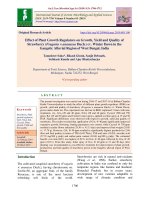
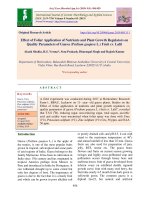
![Effect of different plant growth regulators on shooting of stem cuttings in dragon fruit [Hylocereus undatus (Haworth) Britton & Rose]](https://media.store123doc.com/images/document/2020_01/09/medium_isb1578564896.jpg)
